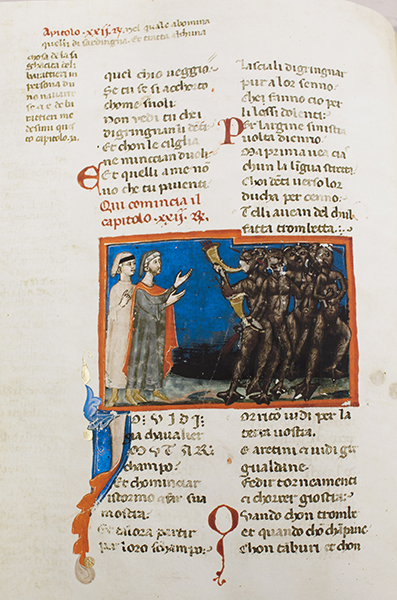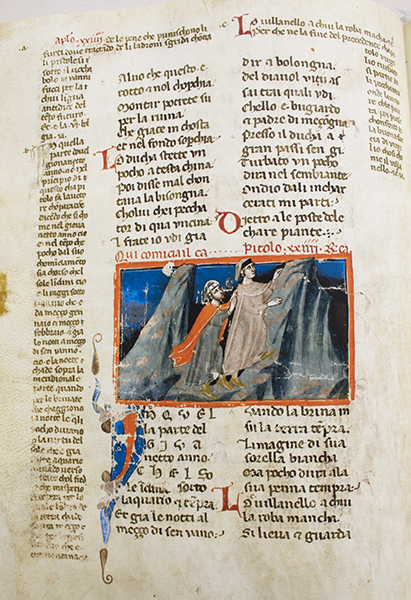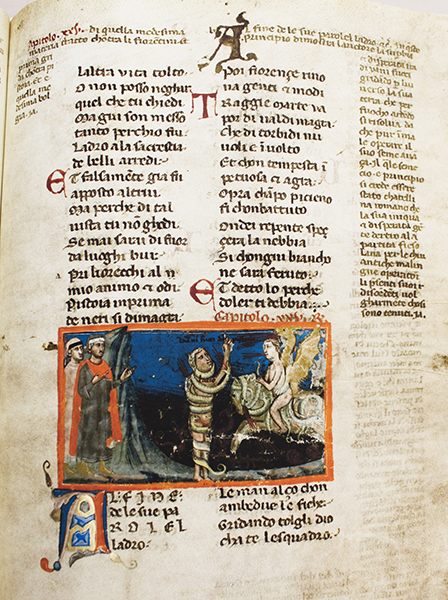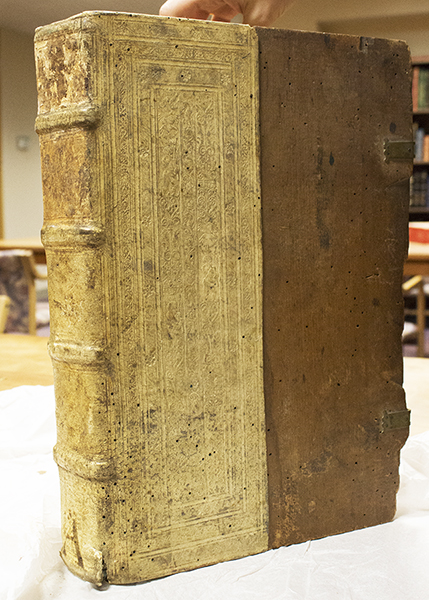A selection of rare materials from McHugh Special Collections is currently on view in the Library’s 5th floor Heritage Room. This week we are highlighting two recent special acquisitions from the exhibit “From Medieval to Modern”: a facsimile of La Divina Commedia Di Dante Alighieri: Manoscritto Pal 313 and the fifth volume of the Complutensian Polyglot Bible.

Thanks to the generosity of the Friends of Weinberg Library, McHugh Special Collections was able to purchase a fine art facsimile of the 14th-century manuscript of Dante’s Divine Comedy. The original manuscript is preserved at the Biblioteca Nazionale in Florence.
The Divine Comedy (written c. 1308-1320) is widely considered one of the greatest works of both Italian literature and world literature. The poem describes Dante’s (c. 1265 – 1321) travels through Hell, Purgatory, and Heaven in its three parts: Inferno, Purgatorio, and Paradiso, but on a deeper level is an allegorical representation of the soul’s journey towards God.
Written in littera textualis (also known as “book hand” or Gothic script), the original manuscript dates between 1333 and 1345 and is known as the Dante Poggiali, after Gaetano Poggiali, the scholar who discovered it in 1800. It is considered the first illustrated Divine Comedy ever produced and is the only surviving manuscript of its kind before 1350. This illuminated version contains 37 precious miniatures for the Inferno by the Florentine workshop of Pacino di Buonaguida. A lesser-known artist in the 14th century, Pacino took inspiration from fellow Florentine artist Giotto in his compositions for the Inferno scenes. In addition to altarpieces, Pacino painted miniatures and decorations for illuminated manuscripts. He is now considered the inventor of miniaturism, a style distinguished by a clear organization of the painting surface into multiple small-scale scenes. The Getty Museum has described Pacino’s work as having “a strong sense of expressiveness and drama.” The miniatures for the Inferno were created using tempera, gold leaf, and ink on parchment. The book also features textual glosses by Dante’s son Jacopo Alighieri whose Commento is a commentary of the text of the Inferno.


McHugh Special Collections received an important rare book donation from Paul Swift ’75 who donated the fifth volume (containing the New Testament) of the Complutensian Polyglot Bible printed in 1514 at Complutense University in Madrid for Cardinal Francisco Jiménez de Cisneros (also known as Ximenes de Cisneros).
This New Testament is from a landmark six volume Bible printed in multiple languages. The Complutensian Polyglot was the first multi-lingual Bible printed in Europe and portions contain Hebrew, Greek, Latin and Aramaic. Work on the polyglot commenced around 1502 but it took until 1517 for printing to be completed. It then took until 1520 to gain papal approval. The donated volume is the first Greek language New Testament printed in Western Europe (also printed in Latin). Mr. Swift donated it in memory of his great aunt Nellie Brown, who purchased the bible in 1931. She was the first woman to take an evening course at St. Thomas College in 1938 and went on to become a medical doctor. He also donated it in memory of his cousin Frank Brown who taught in the history department.


To read more about the Weinberg Library’s Rare Book Collection visit our collection page here. “From Medieval to Modern” will be on display during normal library hours through Tuesday, April 25. On Tuesday, April 11th, Special Collections Librarian Michael Knies will discuss the exhibit at 6 p.m. in the Heritage Room of the Library. A reception will immediately follow the talk. This event is free and open to the public. For more information, please email michael.knies@scranton.edu or call 570- 941-6341.

